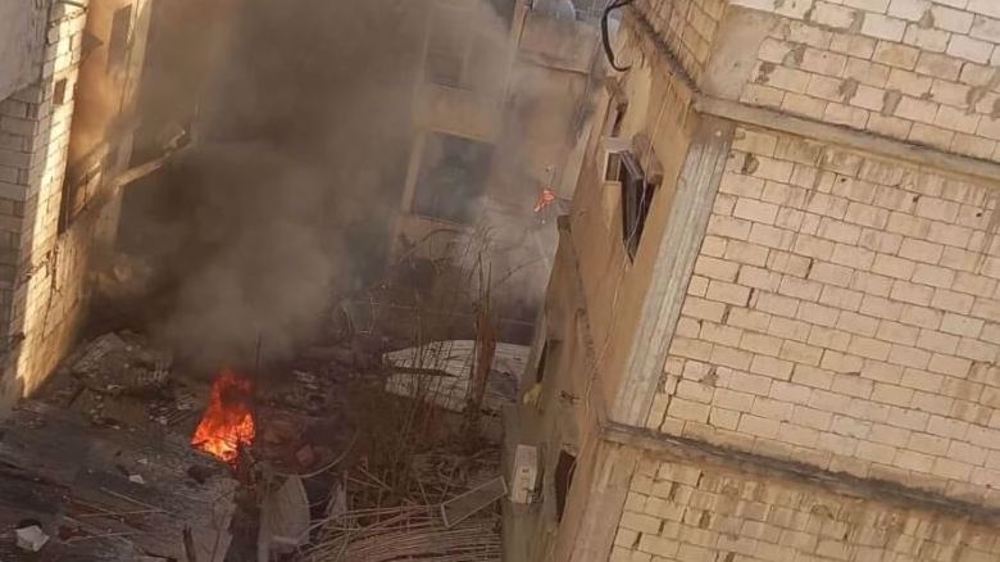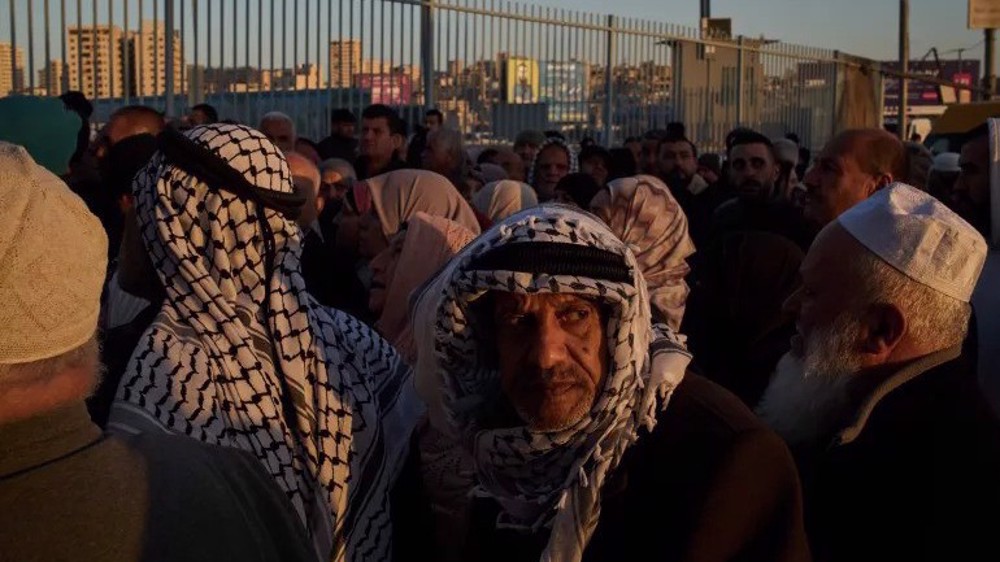New York Times' Pulitzer Prize for Gaza war coverage a travesty of journalism
By Maryam Qarehgozlou
The New York Times has won the Pulitzer Prize for its coverage of the October 7 Hamas-led operation into the occupied territories and its aftermath even though the newspaper has been slammed for distorting the facts about the war and whitewashing the Israeli regime’s genocidal crimes in Gaza.
On Monday, the New York Times staff walked away with a Pulitzer in international reporting for its “wide-ranging and revelatory coverage” of Hamas-led Operation Al-Aqsa Storm, the intelligence failures of the Israeli regime and its no-holds-barred military aggression on Gaza.
The award, understandably, triggered a backlash from pro-Palestine activists as the newspaper has been widely criticized for its biased coverage of the war, for instructing journalists to avoid using terms like “genocide,” and for amplifying the bogus Oct. 7 “sexual violence” claims made by the Israeli regime.
With the Palestinian death toll in besieged Gaza crossing 34,700, the majority of them children and women, Western mainstream media coverage of the genocidal war has been marked by a consistent bias in favor of the oppressed against the oppressed over the past seven months.
The New York Times has disproportionately focused on Israeli deaths in the Hamas-led operation on October 7 while dehumanizing Palestinians and downplaying the Israeli regime’s military aggression against them that has claimed thousands of lives and spawned the worst humanitarian crisis in Gaza.
Interestingly, there has been an internal rebellion in the New York Times. In November, protests by NYT employees were reported at its headquarters in Manhattan over pro-Israel coverage of Gaza.
A discredited story
On December 28, the New York Times ran a controversial article titled “Screams Without Words” alleging that Hamas committed sexual assault during the October 7 operation, which was widely denounced for using unreliable sources and citing cases not backed by evidence.
Investigations by various independent media outlets, including October 7 Fact Check, Mondoweiss, Electronic Intifada, the Grayzone, and the Intercept revealed numerous inconsistencies and contradictions in the stories reported by the NYT.
These outlets laid bare facts about the case that showed the NYT relied on testimonies provided by witnesses with track records of making unreliable claims and lacking forensic credentials.
For instance, the newspaper featured Yossi Landau, a senior official with Zaka, an extremist Zionist group that has been involved in fabricating atrocity propaganda about October 7 to vilify the Palestinian resistance and glorify the Israeli genocidal occupation.
The Intercept reported that Landau is known to have disseminated sensational stories of atrocities that were later proven false, like beheading babies and cutting the fetus from a pregnant woman’s body, but the NYT made no mention of it in its debunked story.
The Intercept report said the Times “relied overwhelmingly” on the narratives of Israeli regime officials, soldiers, and Zaka workers, which was understandably lop-sided.
One of the co-authors of the story, Aant Schwartz, later clarified in a podcast on January 3 that despite her extensive efforts to get confirmation from Israeli hospitals, rape crisis centers, trauma recovery facilities, and sex assault hotlines in the occupied territories, she was unable to get confirmation from any of them and was told that “there had been no complaints made of sexual assaults.”
At the heart of the NYT story was its claim that an Israeli woman called Gal Abdush, referred to in the story as “the woman in the black dress” was a victim of rape before she was killed on October 7.
Her family members and friends repudiated the NYT narrative, saying the story was “invented” and that they had no idea the newspaper was going to use their loved one to further the false rape narrative.
‘A pre-determined narrative’
According to the Intercept, the NYT reporting had a “life-altering impact for thousands of Palestinians whose deaths were justified by the alleged systematic sexual violence orchestrated by Hamas the paper claimed to have exposed.”
It also added that the newspaper’s mission was to “bolster a predetermined narrative.”
Electronic Intifada in its report noted that Israel was “doubling down on one of its most lurid propaganda narratives” because it was facing prosecution for South Africa’s genocide case which was brought before the International Court of Justice (ICJ) at about the same time.
The Gray Zone also said in its investigative article about the shoddy “Hamas mass rape” report that major legacy media organizations like the NYT “continue to ignore serious political scandals [against Israel] while pursuing factually-challenged, shamefully unethical journalistic efforts aimed at legitimizing the Israeli government’s public relations objectives.”
A leaked Gaza memo
Since the Israeli regime launched its genocidal war on Gaza, the mainstream Western media, an extension of Western states, have incessantly sought to whitewash the genocide in Gaza and to distort facts about the Israeli war by belittling Palestinians’ sufferings and portraying Israelis as victims.
The Intercept revealed last month that according to a copy of an internal memo, which was first distributed in November, the New York Times instructed journalists covering Israel’s war on the Gaza Strip to avoid the use of terms such as “genocide” and “ethnic cleansing” and to “avoid” using the phrase “occupied territory” when describing Palestinian land.
Despite the memo’s framing as an effort to not employ incendiary language to describe killings “on all sides,” in the NYT reporting on the Gaza war, such language has been used repeatedly to describe attacks against Israeli occupying forces by Palestinian resistance groups and almost never in the case of Israeli military’s large-scale killing of Palestinians, the report said.
The omission of the words “genocide” and “ethnic cleansing” is in line with the newspaper’s deliberate spin-doctoring of news related to the unfolding genocide in Gaza, according to experts.
Journalists at the newspaper were also advised against using the term "refugee camps" to describe areas in Gaza settled by displaced Palestinians, despite their recognition by the United Nations.
In response to the editorial directives, some journalists within the organization expressed their anger and dissent, highlighting concerns about the standards applied to reporting violence perpetuated by the Israeli regime against Palestinians.
‘A sick joke’
Pro-Palestine activists also took to social media to criticize the New York Times’ Pulitzer win for its coverage of the Gaza genocide, describing it as a “sick joke” and a “parody.”
“NYT got a Pulitzer for international reporting after censoring its coverage of Gaza and whitewashing Israel’s crimes. It’s hard to tell what is parody anymore,” Asal Rad, a US-based activist who holds a PhD in West Asia history, wrote in a post on X, on Tuesday.
Ben Norton, an independent investigative journalist, also said in a post on X that the NYT was handed a Pulitzer Prize for its propaganda on Israel’s genocide in Gaza.
“The US journalism industry is a sick joke,” he asserted.
“The NYT hired an Israeli ex-intelligence official who wants to slaughter Gaza and fabricated fake claims of Hamas sexual assault,” he added, referring to the NYT’s fake story co-authored by Schwartz, who was previously an Israeli air force official.
Schwartz had earlier liked a tweet saying that Israel needed to “turn the strip into a slaughterhouse.”
Jonathan Cook, an award-winning British author and journalist, also said the Pulitzer Prize for the American newspaper should have been given to journalists killed by the Israeli regime in Gaza.
“You might have assumed a Pulitzer Prize would go to the brave journalists of Gaza. More than 100 of them have been killed by Israel in the past seven months – the fiercest eruption of violence against journalists ever. But you’d be wrong,” he said.
“Instead, it was the New York Times that won an award for its ‘revelatory’ coverage of Gaza – presumably a reference to its widely discredited reporting of mass rape by Hamas that the paper has had to quietly walk back and which helped rationalize Israel’s intensified assault on Gaza that resulted in so many Palestinian journalists in Gaza being killed.”
VIDEO | UK court frees remaining jailed members of Palestine Action
VIDEO | Former prince Andrew arrested by British police
VIDEO | Backlash mounts as Pakistan joins US-led Gaza ‘Board of Peace’
Saudi-Greece fiber optic project to pass through Syria instead of occupied territories: Report
Israel steps up bloodshed in Lebanon
US lawmakers move towards vote on limiting Trump’s Iran strike authority
VIDEO | Hebrew media talk ‘Board of Peace,’ ceasefire, anti-Iran rhetoric, tensions surrounding Lebanon
VIDEO | Rising tensions in West Asia










 This makes it easy to access the Press TV website
This makes it easy to access the Press TV website